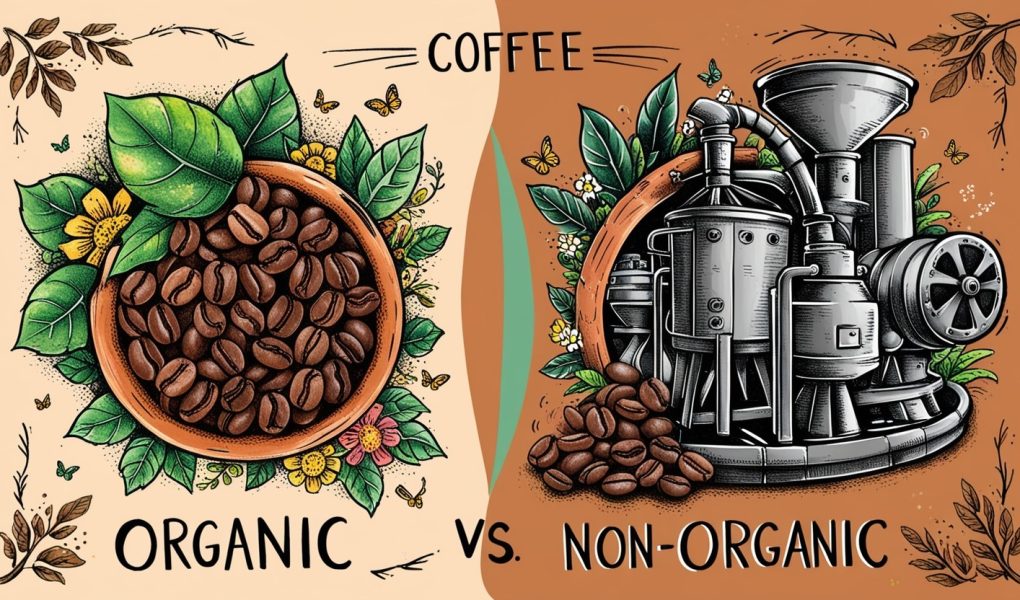Why Organic vs. Non-Organic Coffee Matters
For many of us, coffee isn’t just a morning ritual—it’s a daily essential. But as more people become mindful about what they’re putting in their bodies and how their choices affect the environment, the question of organic vs. non-organic coffee has become more relevant than ever. With so many options on the shelf, it can be hard to know what sets organic coffee apart from its non-organic counterpart. Is it healthier? Does it taste better? And what about the environmental impact?
Understanding the difference between organic and non-organic coffee goes beyond just reading the label. It’s about digging into how the coffee is grown, processed, and brought to your cup. From the use of synthetic chemicals in farming to the potential health benefits of choosing organic, there’s a lot to consider when deciding which kind of coffee is right for you.
In this article, we’ll explore what makes organic coffee different from non-organic, why these differences matter, and how to make a choice that aligns with your values, whether you’re focused on flavor, health, or sustainability.
What is Organic Coffee?
Organic coffee is more than just a trendy label—it’s about how the coffee is grown, processed, and handled, all with a focus on sustainability and natural methods. When coffee is labeled as organic, it means it was cultivated without the use of synthetic pesticides, herbicides, or chemical fertilizers. Instead, farmers rely on natural processes and organic materials to protect the crops and nurture the soil. This approach isn’t just better for the environment, it also ensures that no synthetic chemicals make their way into your morning brew.
To be considered organic, coffee farms must meet strict certification standards, often verified by organizations like the USDA Organic or similar bodies in other countries. These standards don’t just cover what happens in the field—they also extend to how the coffee is processed after harvesting. Organic coffee must be handled separately from non-organic coffee throughout the entire supply chain to avoid any cross-contamination.
But organic farming is more than just following rules. It’s about promoting healthier ecosystems. By avoiding synthetic chemicals, organic farms help preserve soil health, reduce water contamination, and encourage biodiversity. In short, organic coffee is about growing coffee in a way that’s better for both the planet and your cup.
What is Non-Organic Coffee?
Non-organic coffee is what most of us have been drinking for years—it’s grown using conventional farming methods that rely on synthetic pesticides, herbicides, and chemical fertilizers to protect the crops and boost yields. These chemicals are designed to ward off pests and diseases, helping farmers produce larger quantities of coffee beans at a lower cost. While this approach makes coffee more affordable and accessible, it does come with trade-offs.
In non-organic farming, the focus is often on maximizing production. This means coffee is grown on large plantations, where the use of chemicals can help ensure a more predictable crop each season. However, the long-term effects of these practices can lead to issues like soil degradation and water pollution. The widespread use of pesticides and fertilizers can also impact the surrounding ecosystems, affecting plant and animal life beyond the farm.
From a consumer standpoint, non-organic coffee can still deliver great flavor, but there’s a chance that trace amounts of chemicals may remain on the beans, even after roasting. For many coffee drinkers, the decision to choose non-organic coffee often comes down to cost, convenience, or personal taste preferences.
Non-organic coffee is a staple in the global market, and while it doesn’t meet the same environmental or health standards as organic varieties, it’s a popular choice for millions of people around the world.
The Environmental Impact of Organic vs. Non-Organic Coffee
One of the most significant differences between organic and non-organic coffee is their impact on the environment. The way coffee is grown, processed, and managed can have lasting effects on ecosystems, soil health, and local communities. Understanding these impacts can help you make a more eco-conscious choice when it comes to your daily brew.
1. Organic Coffee: Supporting Sustainability
Organic coffee is grown with a focus on sustainability. Organic farmers avoid synthetic pesticides and fertilizers, which means less harmful chemicals end up in the soil, water, and surrounding environment. Instead, they use natural methods like composting, crop rotation, and shade-grown farming to protect their crops. These practices help preserve biodiversity, keep ecosystems balanced, and prevent water contamination.
Organic coffee farming also promotes healthier soil. By using organic matter like compost to enrich the land, farmers improve soil fertility and structure, which helps plants thrive without depleting natural resources. The result is not only better crops but also a more sustainable way of farming that protects the land for future generations.
2. Non-Organic Coffee: Larger Yields, Greater Impact
Non-organic coffee farming, on the other hand, typically prioritizes higher yields, often relying on synthetic chemicals to protect crops from pests and disease. While this approach can lead to more efficient production, it comes at a cost to the environment. The use of pesticides and chemical fertilizers can pollute soil and water, harm wildlife, and contribute to deforestation as more land is cleared for farming.
Non-organic coffee is also more likely to be grown in large, industrial farms where the focus is on maximizing production. These farms may not always take steps to protect local ecosystems or conserve resources, which can lead to long-term environmental damage. While non-organic coffee is often more affordable, it can have a larger ecological footprint due to the intensive farming methods used.
3. Shade-Grown vs. Sun-Grown Coffee
Many organic coffee farms are shade-grown, meaning the coffee plants grow under the natural canopy of trees. This method not only reduces the need for chemical inputs but also protects forest habitats for birds, insects, and other wildlife. Shade-grown coffee helps maintain biodiversity and creates a more balanced ecosystem.
Non-organic coffee is often grown in direct sunlight to increase yields, which requires more chemical intervention to protect the crops. Sun-grown coffee can lead to deforestation, soil erosion, and the loss of habitats for animals that rely on the forest canopy.
Choosing organic coffee is about more than just avoiding chemicals—it’s a way to support farming practices that prioritize sustainability and environmental health. While non-organic coffee might offer higher yields and lower prices, the environmental impact is often greater. For those who care about protecting the planet, organic coffee offers a more eco-friendly option that aligns with a commitment to sustainability.
Health Benefits: Organic Coffee vs. Non-Organic Coffee
When it comes to coffee, many people are paying closer attention not just to flavor, but also to the health benefits of what they’re drinking. Organic coffee and non-organic coffee both offer that familiar caffeine boost, but there are some important differences when it comes to how each type might affect your health.
1. Organic Coffee: Fewer Chemicals, More Peace of Mind
One of the main reasons people choose organic coffee is to avoid exposure to synthetic chemicals. Organic coffee is grown without the use of synthetic pesticides, herbicides, or chemical fertilizers, which means the beans are free from these residues. For those who are concerned about long-term exposure to chemicals in their food, choosing organic coffee offers extra peace of mind.
In addition to being free from synthetic chemicals, organic coffee is often grown in healthier soil, which may lead to higher levels of certain nutrients and antioxidants. Some studies suggest that coffee grown in richer, organic soil can have slightly higher concentrations of antioxidants, which are known for their role in fighting inflammation and protecting cells from damage.
2. Non-Organic Coffee: Safe but with Potential Residues
Non-organic coffee is grown using conventional farming practices, which often involve the use of synthetic pesticides and fertilizers. While the beans are typically washed and roasted before they reach your cup, trace amounts of chemical residues may remain. However, these levels are generally considered safe by regulatory standards, and many people drink non-organic coffee daily without any noticeable health effects.
That said, for individuals who are more sensitive to chemicals or are trying to reduce their exposure to synthetic substances, non-organic coffee might raise concerns. While the overall risk from these residues is considered low, some consumers prefer to minimize their intake of chemicals as much as possible, which is where organic coffee comes into play.
3. Antioxidants and Nutrients
Both organic and non-organic coffee are rich in antioxidants, particularly chlorogenic acid, which has been linked to various health benefits like reducing inflammation and supporting heart health. However, the levels of these beneficial compounds can vary depending on how the coffee is grown. Some proponents of organic coffee argue that because it’s grown in healthier, more nutrient-dense soil, it might contain slightly higher levels of these antioxidants.
That said, the difference in antioxidant content between organic and non-organic coffee is likely to be small, and both types offer similar health benefits when consumed in moderation.
4. The Bigger Picture: Choosing What’s Best for You
At the end of the day, both organic and non-organic coffee offer similar health benefits in terms of providing antioxidants and that beloved caffeine boost. The main difference comes down to how the coffee is grown and processed. If avoiding synthetic chemicals is important to you, organic coffee provides a cleaner option. If you’re more concerned with taste, convenience, or cost, non-organic coffee is still a safe and popular choice.
Ultimately, the decision between organic and non-organic coffee is a personal one. Both can be part of a healthy lifestyle, and the choice often depends on your individual preferences and priorities when it comes to health and sustainability.
Taste Differences: Does Organic Coffee Taste Better?
When it comes to coffee, taste is a deeply personal thing. Some people prefer bold, rich flavors, while others go for something smoother and more delicate. So, does organic coffee actually taste better than non-organic coffee? The answer, like so many things with coffee, depends on a mix of factors—including how the coffee is grown, processed, and brewed.
1. The Impact of Farming on Flavor
One of the reasons people believe organic coffee tastes better is because of the way it’s grown. Organic farming focuses on nurturing healthy soil without the use of synthetic chemicals. This method often leads to a more natural growing process, which can result in beans that have a cleaner, more nuanced flavor. Without the influence of pesticides or chemical fertilizers, some coffee drinkers say organic beans offer a purer, more authentic taste that highlights the natural characteristics of the coffee.
On the flip side, non-organic coffee can still deliver an amazing cup. Conventional farming methods allow for greater control over the growing process, which can lead to consistently high-quality beans. Many non-organic coffees are produced with great care, and their flavors are no less impressive—just because a coffee isn’t organic doesn’t mean it can’t taste fantastic.
2. Soil Health and Its Role in Flavor
Organic coffee is often grown in nutrient-rich soil, which some experts believe can lead to more complex flavor profiles. Healthy soil helps plants develop fully, and that can translate to beans with more depth and variety in taste. Organic beans might have subtle notes of fruit, chocolate, or spice, depending on the region and growing conditions.
Non-organic coffee, which is grown using synthetic fertilizers, may not always benefit from the same soil health, but it can still produce beans with robust flavor. In fact, many of the world’s most popular coffee brands are non-organic, known for their strong, consistent flavors that appeal to a wide range of palates.
3. The Role of Processing and Roasting
Whether coffee is organic or non-organic, much of the final flavor depends on how the beans are processed and roasted. Organic coffee might be more likely to come from small farms that focus on traditional, hands-on processing methods, which could contribute to a more artisanal feel and taste. On the other hand, non-organic coffee often benefits from advanced processing technologies that can ensure a consistent flavor in every cup.
Roasting also plays a huge role in taste. Light roasts bring out the more delicate, fruity flavors of the bean, while darker roasts highlight bolder, richer notes. Both organic and non-organic coffee can be roasted to perfection, so it really comes down to how you like your coffee.
4. Personal Preferences
At the end of the day, whether organic coffee tastes better is really up to you. Some people swear by the clean, smooth flavor of organic coffee, while others prefer the richness and consistency of non-organic varieties. Taste is subjective, and what matters most is finding a coffee that suits your palate.
If you’re curious, it’s worth trying both organic and non-organic coffees to see which one you prefer. You might find that the farming method has a noticeable effect on taste—or you might discover that it’s the roast, region, or brewing method that makes the biggest difference in your cup.
While organic coffee is often praised for its pure, complex flavors, non-organic coffee can be just as satisfying. In the end, taste comes down to personal preference, and both types of coffee can offer a delicious experience. So, whether you’re enjoying a cup of organic beans or your favorite non-organic brew, the most important thing is that you love what’s in your mug.
Cost Comparison: Is Organic Coffee Worth the Higher Price?
One of the most noticeable differences between organic and non-organic coffee is the price. Organic coffee tends to cost more, and if you’re a regular coffee drinker, those extra dollars can add up. So the big question is: is organic coffee really worth the higher price, or are you better off sticking with non-organic?
1. Why Organic Coffee Costs More
The higher price tag on organic coffee isn’t just about the label. There are a few key reasons why organic beans cost more than their non-organic counterparts. First, organic farming is more labor-intensive. Without synthetic pesticides and fertilizers to protect crops, organic farmers often need to use manual methods, like hand-weeding and natural pest control, which can take more time and effort.
Second, organic coffee farms tend to produce lower yields. Because they avoid chemical boosts to growth, organic farmers might harvest fewer beans from the same amount of land compared to non-organic farms. These smaller yields drive up the cost of production, which is then reflected in the price you pay at the store.
There’s also the certification process. Organic coffee growers need to meet strict standards to earn organic certification, and maintaining that certification involves ongoing costs for compliance and inspections. All of these factors contribute to the higher price you see on the shelf.
2. Balancing Cost with Benefits
For many people, the decision to buy organic coffee comes down to more than just the price—it’s about the perceived benefits. If you’re someone who values sustainability, supporting environmentally friendly farming practices might make the extra cost of organic coffee feel more worthwhile. You’re not just paying for the coffee itself, but also for the idea that your purchase is helping to protect ecosystems, reduce chemical use, and promote healthier soils.
From a health perspective, organic coffee offers the peace of mind that you’re not consuming any synthetic pesticide residues. While non-organic coffee is generally considered safe, some people prefer to minimize their exposure to chemicals, and organic coffee provides that assurance. For those who prioritize these factors, the higher price might feel justified.
3. Non-Organic Coffee: More Affordable, Still Delicious
Non-organic coffee is often significantly cheaper, and that makes it an appealing choice for many coffee drinkers. Conventional farming methods allow for higher yields and lower production costs, which translates to lower prices in the store. If you’re someone who drinks a lot of coffee, the cost savings from choosing non-organic can be substantial over time.
And when it comes to taste, many non-organic coffees can hold their own against organic varieties. There are plenty of high-quality, delicious non-organic coffees out there that offer great flavor without the higher price tag. If your main focus is on enjoying a rich, satisfying cup of coffee without breaking the bank, non-organic options can be just as rewarding.
4. Is Organic Coffee Worth It?
Whether organic coffee is worth the higher price really depends on your priorities. If you’re committed to supporting sustainable farming practices or avoiding synthetic chemicals, the extra cost of organic coffee might feel like a fair trade-off. But if you’re more focused on budget-friendly options and great taste, non-organic coffee offers plenty of value without the higher price tag.
Ultimately, it’s a personal decision. Some coffee drinkers are happy to pay a premium for organic beans, while others are perfectly satisfied with non-organic options. The best choice is the one that fits your values and your budget, allowing you to enjoy your coffee with confidence, no matter which type you choose.
Conclusion: Choosing Between Organic and Non-Organic Coffee
When it comes to choosing between organic and non-organic coffee, it’s about more than just what’s in your cup—it’s about what matters to you. Organic coffee offers the promise of fewer chemicals, environmentally friendly farming practices, and a cleaner, more natural flavor. It can feel like a small way to contribute to sustainability, but it does come with a higher price tag.
Non-organic coffee, on the other hand, is often more affordable and widely available, and it still delivers on taste and quality. While it may not meet the same environmental or health standards as organic varieties, it’s a choice that works for many coffee drinkers who prioritize budget or convenience without compromising on flavor.
At the end of the day, the right choice depends on your values and what you’re looking for in your coffee. Whether you opt for organic or non-organic, the most important thing is that you enjoy your coffee experience. After all, coffee is one of those simple pleasures in life, and whether it’s organic or not, it’s meant to be savored.



